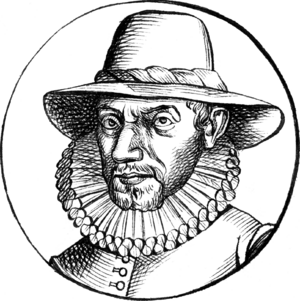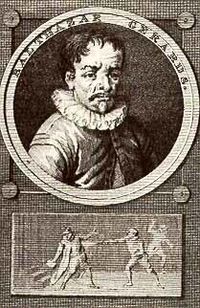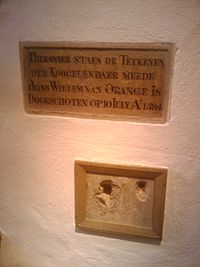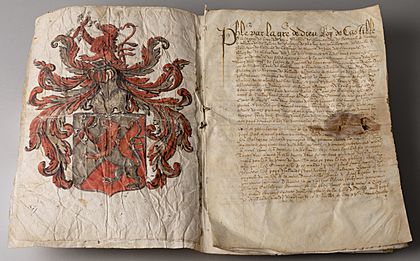Balthasar Gérard facts for kids
Quick facts for kids
Balthasar Gérard
|
|
|---|---|

Portrait of Gérard, c. 16th century. Author unknown. Stedelijk Museum het Prinsenhof, Delft
|
|
| Born | c. 1557 Vuillafans, Franche-Comté
|
| Died | 14 July 1584 (aged 26 or 27) |
| Nationality | Franc-Comtois |
| Other names | Gerards, Gerardts |
| Known for | Assassination of William the Silent |
Balthasar Gérard (alternative spellings Gerards or Gerardts; c. 1557 – 14 July 1584) was the assassin of the Dutch revolt's leader, William the Silent of the House of Orange (William the Silent, and later known as the "Father of the Fatherland"). He killed William the Silent in Delft on 10 July 1584, by shooting him twice with a pair of pistols, and was afterwards tried, convicted, tortured, and executed.
Gérard was born in Franche-Comté (then belonging to Holy Roman Empire, afterwards to France). He came from a Roman Catholic family with 11 children and was a great admirer of Philip II, king of Spain and the Netherlands. He studied law at the University of Dole. On 15 March 1580, King Philip had offered a reward of 25,000 crowns, peerage and an inheritable estate to anyone who killed or captured William the Silent, to whom he referred in his decree as a "pest on the whole of Christianity and the enemy of the human race".
Contents
Preparations
After the reward offered by Philip was published, Gérard left for Luxembourg, where he learned that Juan de Jáuregui had already been preparing to attempt the assassination, but this attempt did not succeed. In March 1584 he went to Trier, where he put his plan before the regent of the Jesuits, but another Jesuit convinced him to change his original scheme and go to the prince of Parma. In Tournai, after holding counsel with a Franciscan, Father Gery, Gérard wrote a letter, a copy of which was deposited with the guardian of the convent, and the original presented personally to the Prince of Parma. In the letter Gérard wrote, in part, "The vassal ought always to prefer justice and the will of the king to his own life."
At first the prince thought him unfit but after consulting Haultepenne and others with the letter he was assigned to Christoffel d'Assonleville, who spoke with Gérard, and asked him to put this in writing, which he did on 11 April 1584. He requested absolution from the prince of Parma "as he was about to keep company for some time with heretics and atheists, and in some sort to conform himself to their customs".
For his first expenses he begged for 50 crowns, which were refused. "I will provide myself out of my own purse", Gérard told Assonleville, "and within six weeks you will hear of me." Assonleville responded: "Go forth, my son ... and if you succeed in your enterprise, the King will fulfill all his promises, and you will gain an immortal name besides." On Sunday, 8 July 1584, Gérard loitered in the courtyard of the Prinsenhof examining the premises. A halberdier asked him why he was waiting there. He excused himself by saying that in his present shabby clothing and without new shoes he was unfit to join the congregation in the church opposite. The halberdier unsuspectingly arranged from the Prince of Orange himself a gift of 50 crowns for Gérard, who the following morning purchased a pair of pistols from a soldier, haggling the price for a long time because the soldier could not supply the particular chopped bullets or slugs he wanted.
The shooting
On 10 July 1584, as William the Silent climbed the stairs to the second floor, he was spoken to by the Welsh captain Roger Williams, who knelt before him. William put his hand on the bowed head of the old captain, at which moment Gérard jumped out of a dark corner. He drew his weapons and fired two shots at the stadtholder. William the Silent collapsed. His sister knelt beside him, but it was too late. The exact story surrounding the last moments before his death are lost to history, but according to legend he was asked whether he commended his soul to Christ, he answered in the affirmative. His last words were, Mon Dieu, ayez pitié de moi et de mon pauvre peuple ("My God, have mercy on me and on my poor people"). The contemporary consensus among Dutch historians is that William the Silent could not have said this, as he was most likely dead at the instant he was shot. However, his legendary final words remain a part of the Dutch historical canon.
Gérard fled through a side door and ran across a narrow lane, pursued by Roger Williams. Gérard had almost reached the ramparts, from which he intended to jump into the moat. On the other side a saddled horse stood ready. A pig's bladder around his waist was intended to help keep him afloat. However, he stumbled over a heap of rubbish. A servant and a halberdier of the prince who had raced after him caught him. When called a traitor by his captors, he is said to have replied, "I am no traitor; I am a loyal servant of my lord." "Which lord?", they asked. "Of my lord and master, the king of Spain". At the same time more pages and halberdiers of the prince appeared and dragged him back to the house under a rain of fists and beatings with the butt of a sword. Hearing his assailants chatter and convinced he heard the prince was still alive, he cried "Cursed be the hand that missed!"
The shooting is notable for being the first recorded political assassination of a head of state with a firearm. After William the Silent's murder, more than 200 years would pass until another head of state was killed by a firearm, when Gustav III, King of Sweden, was fatally wounded at a midnight masquerade in 1792.
Aftermath
Philip II gave Gérard's parents, instead of the reward of 25,000 crowns, three country estates in Lievremont, Hostal, and Dampmartin in the Franche-Comté, and the family was raised to the peerage. Philip II would later offer the estates to Philip William, Orange's son and the next Prince of Orange, provided the prince continue to pay a fixed portion of the rents to the family of his father's murderer; the insulting offer was rejected. The estates remained with the Gérard family. The apostolic vicar Sasbout Vosmeer tried to have Gérard canonized, to which end he removed the dead man's head and showed it to church officials in Rome, but the idea was rejected.
Legacy
The village of Vuillafans renamed the street where Gérard was born "Rue Gérard" in his memory.
See also
 In Spanish: Balthasar Gérard para niños
In Spanish: Balthasar Gérard para niños




